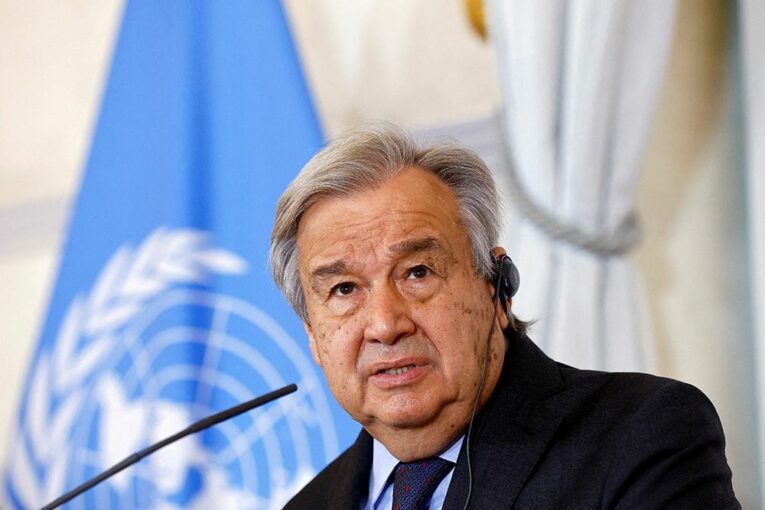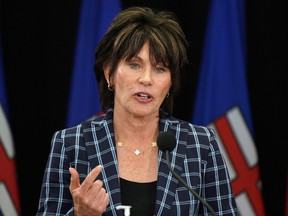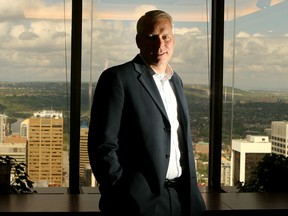
As U.S. natural gas prices soar to their highest point since 2008 and oil trades above US$110 a barrel, the world is clearly thirsty for more energy.
On Tuesday, the United Nations secretary-general delivered a different kind of message about energy to a group of graduating university students: Don’t take a job tied to the fossil fuel sector.
Needless to say, his remarks triggered a sharp response from Alberta’s energy minister and some industry leaders who attended the annual Calgary Energy Roundtable conference on Wednesday.
“It’s out of touch with the reality on the ground. And, frankly, it’s dangerous. It’s dangerous because we are in an energy security crisis,” Energy Minister Sonya Savage said after speaking at the event, which focused this year on technology, innovation and transition.
“There are going to be jobs in hydrogen. There are going to be jobs in carbon capture, geothermal, critical and rare earth minerals. There’s a huge future ahead and we need all of that energy, all sources of energy.
“So to sort of be telling people to not work in oil and gas is just . . . divorced from reality.”

During a speech this week to graduates at Seton Hall University in New Jersey, UN Secretary-General Antonio Guterres said climate change is “wreaking havoc” and threatening to erase entire communities and countries, while governments are failing to take the necessary action.
He told the university students their talents will be in demand from large companies and financial institutions.
“We know investing in fossil fuels is a dead end, economically and environmentally,” he said. “My message to you is simple: Don’t work for climate-wreckers. Use your talents to drive us toward a renewable future.”
Well, that has about as much nuance as someone wielding a sledgehammer in a glassware store.
It adds more fuel to a highly polarized debate at a time when oil and gas supplies are needed, decarbonization efforts are increasing, and geopolitical tensions have escalated following Russia’s invasion of Ukraine.
Oil and gas will also be required for years to come as the world’s population is expected to grow by two billion people by 2050, according to the International Energy Agency.
In its annual world energy outlook released last October, the Paris-based IEA said global oil demand is expected to decline in all three of the future scenarios it examined, “although the timing and speed of the drop may vary widely.”
The world consumes almost 100 million barrels of oil per day (bpd) and will use about 75 million bpd by 2050 if current government climate pledges are met, the report stated. The number will fall to about 25 million bpd under its net-zero by 2050 scenario.
Precision Drilling Corp. CEO Kevin Neveu called Guterres’ comments deliberately provocative, “driving that emotional response that says that we are evil, which is the way it comes out . . . it’s just disappointing.”
However, the remarks overlook the reality that a massive effort will be required to decarbonize oil and natural gas — and skilled workers will be needed to make it happen, he noted.
“If your goal really is to drive lower emissions, we should be finding ways to make our industry better — and have high-quality talent coming to our industry to help make the industry better,” Neveu said in an interview.
“It’s a counterproductive message.”

But the time for careful remarks is over, said Keith Stewart, Greenpeace Canada’s senior energy strategist.
“It is fascinating watching someone who is the most significant diplomat in the world, in many ways, speaking so undiplomatically — but speaking politely hasn’t worked,” Stewart said.
The secretary-general’s comments do highlight the discussion around the speed of the energy transition, but also the immediate issue of employment within the industry.
The Canadian energy sector is facing a labour crunch today.
Neveu noted Precision Drilling increased its staffing by about 30 per cent from last summer into the winter, and could match that growth again over a four-month period later this year.
According to a Canadian oilpatch labour market outlook published last year by the PetroLMI Division of Energy Safety Canada, total direct industry employment dropped by 20,000 to 168,000 during the first year of the pandemic.
It’s expected to sit at 176,000 jobs by 2023, the final year of its forecast. Yet, those modest increases were crafted before the recent surge in oil and gas prices.
In fact, almost 180,000 Canadians were directly employed in the sector in April. According to the group’s monthly report, the unemployment rate in the Canadian energy industry fell to just 2.8 per cent in April, well down from 7.9 per cent a year earlier.
Shell Canada president Susannah Pierce noted skills in the oil and gas industry are applicable to other forms of energy, such as geothermal and hydrogen.
“The oil and gas training that you can get in the universities actually enables you to play a part in the energy we need today, but then also creates transferable skills that you can then use for the energies we’re going need for tomorrow,” she said on the sidelines of Wednesday’s event.
Now, job growth in the Canadian industry during a period of high prices is not the same as the outlook 10 or 20 years from now.
But what is clear is that the world’s population is growing and more energy will be required from many sources — and more trained people will be needed to make it all happen.
“The world still depends on fossil fuels today . . . You’re still going to need to be able to provide the energy that people need,” added Pierce.
“We know that, but it’s a question of how do you provide the energy that people need while you continue to decarbonize?”
Chris Varcoe is a Calgary Herald columnist.
You can read more of the news on source
